Cinnamon is a precious medicinal herb since ancient times and is well-known for its good uses and benefits in our lives. However, overusing cinnamon can also have opposite effects, especially overusing the cinnamon stick – a cinnamon type with a very high essential oil content. This article will provide you with everything you need to know about cinnamon stick benefits and side effects!
What Is Cinnamon?
Cinnamon is the dried inner bark of several trees from the genus Cinnamomum, particularly the Ceylon cinnamon tree (Cinnamomum zeylanicum). After harvesting, the bark is dried and then ground into a powder or rolled into quills. As a familiar spice in Vietnamese and many other world cuisines, cinnamon not only imparts a distinctive flavor but also offers a myriad of health benefits.
What Types of Cinnamon Are There?
There are four major types of cinnamon. Darker-colored cassia cinnamon is the one most commonly sold in the U.S. It’s grown in southeastern Asia. Ceylon cinnamon, also known as true cinnamon, is often used in other countries.
The cinnamon you buy at the store could be one of the two main types, Ceylon or cassia, or a mixture of both. Ceylon is easier to grind and has more health benefits.
What does a cinnamon stick look like?
True to its name, the cinnamon stick is shaped like a stick with an average length of 20 – 45 cm.

After harvesting the bark of the cinnamon tree, the farmer will cut the cinnamon bark into pieces with a length of 20 – 45 cm and a width of about 3 – 5 cm, then let the cinnamon bark dry naturally in sunlight or dried to achieve a certain roll level.
Cinnamon stick nutritional value
There are many benefits of cinnamon stick as it’s a rich source of nutrition. According to the United States Department of Agriculture, 2.6g of the cinnamon stick provides 6.42 calories and contains some of the following substances:
- 2.1g of carbohydrates
- 6.1 mg of calcium
- 0.21mg iron
- 1.56mg magnesium
- 1.66mg phosphorus
- 11.2mg potassium
0.39 micrograms of vitamin A
Cinnamon stick benefits come mostly from the contents of trace amounts of B vitamins, vitamin K, and antioxidants such as choline, beta-carotene, alpha-carotene, beta-cryptoxanthin, lycopene, lutein, and zeaxanthin, which may reduce oxidative stress and may help prevent cancer, type 2 diabetes and a number of other diseases. Besides, the cinnamon leaves contain two main compounds cinnamaldehyde and trans-cinnamaldehyde that are beneficial to the human body. The bark of the cinnamon plant also contains catechins (a major antioxidant found in green tea) and procyanidins (a major antioxidant found in berries).
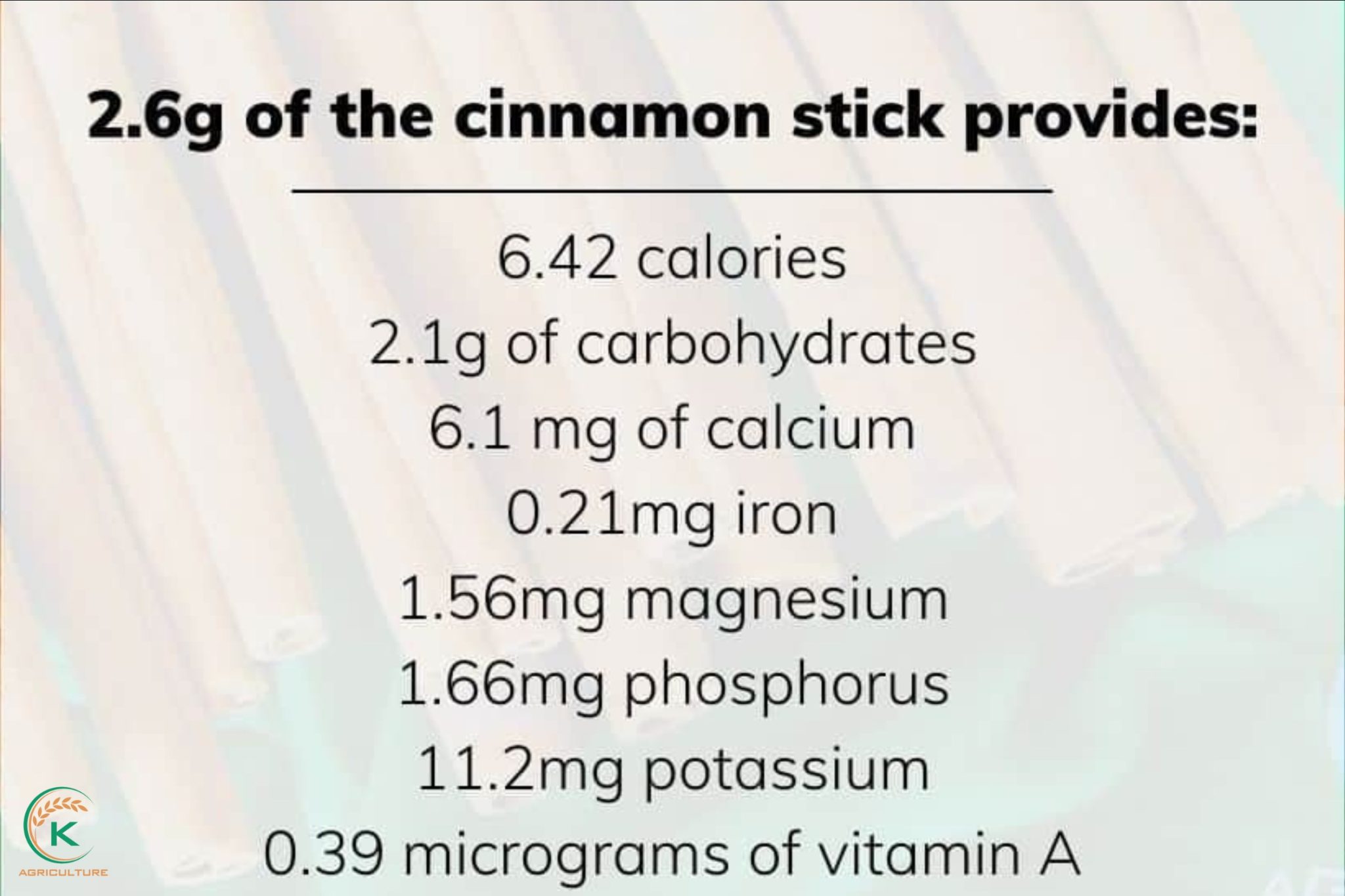
6 amazing cinnamon stick benefits
The cinnamon stick has been used for centuries for its many health benefits such as blood sugar control, weight loss, improved digestion, and respiratory disorders.
Control blood sugar
According to the National Center for Complementary and Integrative Health (NCCIH), one of the cinnamon stick benefits is widely used not only to control blood sugar but also to prevent complications related to diabetes. According to a study that came out a few years ago, people with diabetes were divided into groups to use cinnamon, maybe 1.3 or 6 grams of cinnamon per day in capsule form. Results showed that all 3 groups using this capsule experienced an 18 – 29% reduction in blood sugar after 40 days of use.
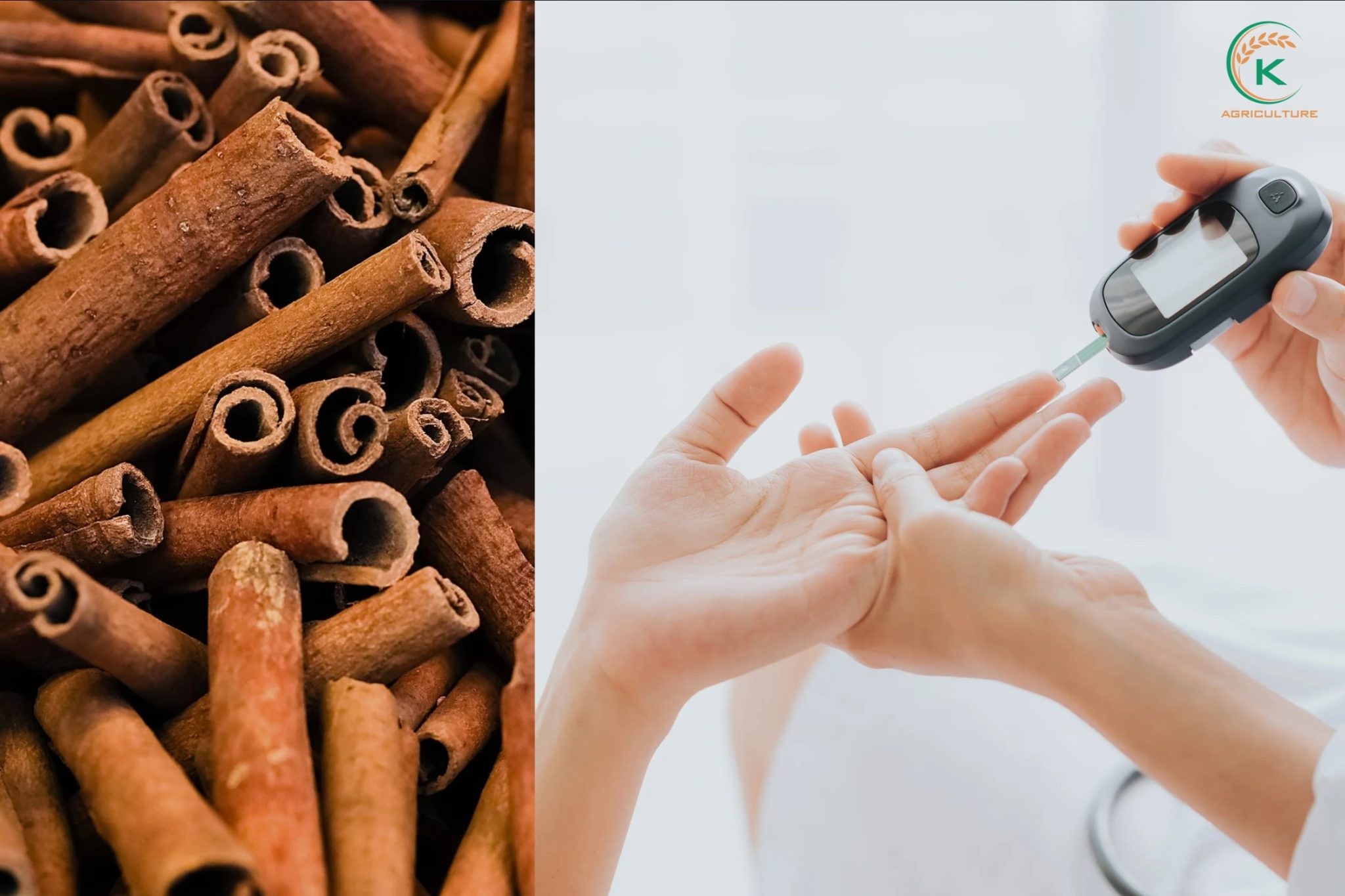
For type 2 diabetes and pre-diabetes, the cinnamon stick helps blood sugar levels not rise much after eating. It also helps increase the ability to use sugar in the cells and contributes to regulating blood sugar. Several substances in cinnamon help fat cells recognize and respond well to insulin. You can try adding a small amount of cinnamon when preparing food for people with coronary artery disease and high blood pressure. However, in some cases, it is necessary to consult a specialist before using cinnamon in treatment.
Cinnamon stick reduces the risk of obesity
Cinnamon contains a large number of polyphenols that promote weight loss, increase metabolism as well as break peptide bonds in the body. The hydroxycinnamaldehyde compound in cinnamon has the ability to prevent inflammation and prevent fat from accumulating in the blood, helping to reduce belly fat, lower blood cholesterol, prevent cardiovascular disease, and blood fat.
Using cinnamon powder in daily drinks will help improve weight. Besides, cinnamon also helps prevent obesity, increase resistance, and control weight effectively.
Prevent heart disease
Another among cinnamon stick benefits is that
cinnamaldehyde and cinnamic acid in cinnamon have cardioprotective effects, along with potent anti-inflammatory properties. High cholesterol levels can lead to atherosclerosis, which is the cause of heart-related problems. Consuming honey and cinnamon has the potential to reduce the risk of cardiovascular disease by regulating cholesterol levels in the body.
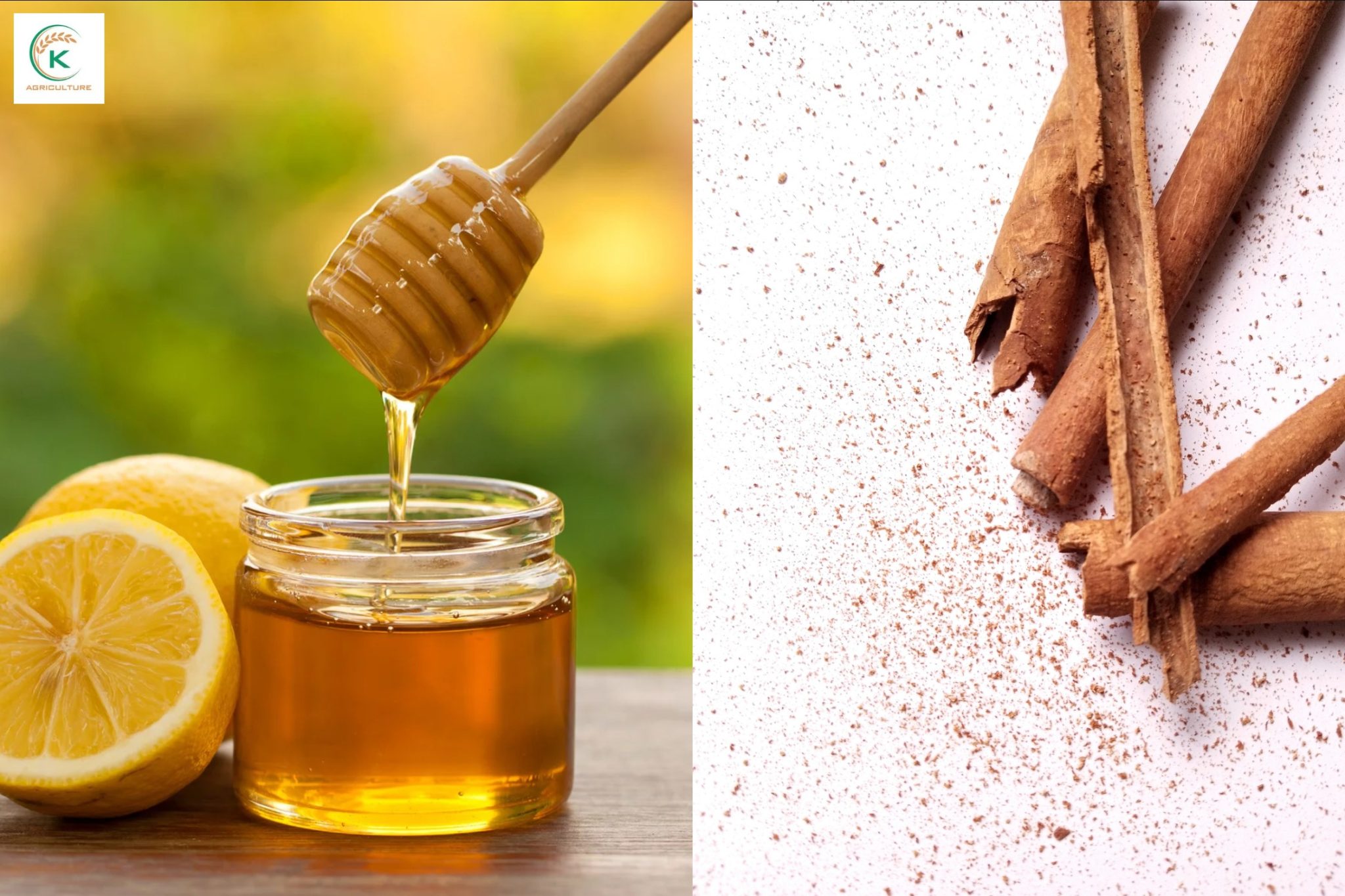
Honey has been shown to reduce LDL (bad) cholesterol levels by 6%, triglyceride levels by 11% and potentially increase HDL (good) cholesterol levels. In contrast, cinnamon helps lower total cholesterol levels. Polyphenols in honey also help improve blood flow to the heart, prevent blood clots, and reduce the risk of heart attack and stroke.
Boost brain function
Studies conducted at Healthspan Center (UK) highlight the potential of cinnamon in the prevention and treatment of Alzheimer’s disease. Cinnamon is thought to increase the production of sodium benzoate in the brain, a compound that directly acts on the hippocampus, an area essential for memory and learning. Studies have also shown that using cinnamon increases cognition, memory efficiency, concentration, and acuity.
Lower blood pressure and improve cholesterol
One of the best cinnamon stick benefits is its ability to fight heart disease. Because of this effect, the cinnamon stick has also been shown to support healthy blood pressure and cholesterol levels. Studies have shown that just half a teaspoon of cinnamon in your daily meal can help lower cholesterol levels and reduce bad LDL cholesterol and triglycerides (fatty acids in the blood). In an animal study, researchers revealed that consuming cinnamon for 35 days actually improved cholesterol and triglyceride levels and effectively manage HDL cholesterol.
Help to fight colds and flatulence
The cinnamon stick benefits are stated that it is very effective in fighting cold season infections like colds or flu. In addition to its antioxidant properties, this little brown spice is an excellent source of essential minerals like manganese, iron, and calcium. Therefore, it helps to strengthen the immune system and clears the respiratory tract in case of a cold. To do this, soak two cinnamon sticks for about 5 minutes in a cup of boiling water. Add a teaspoon of lemon, half a teaspoon of honey, and grated ginger.
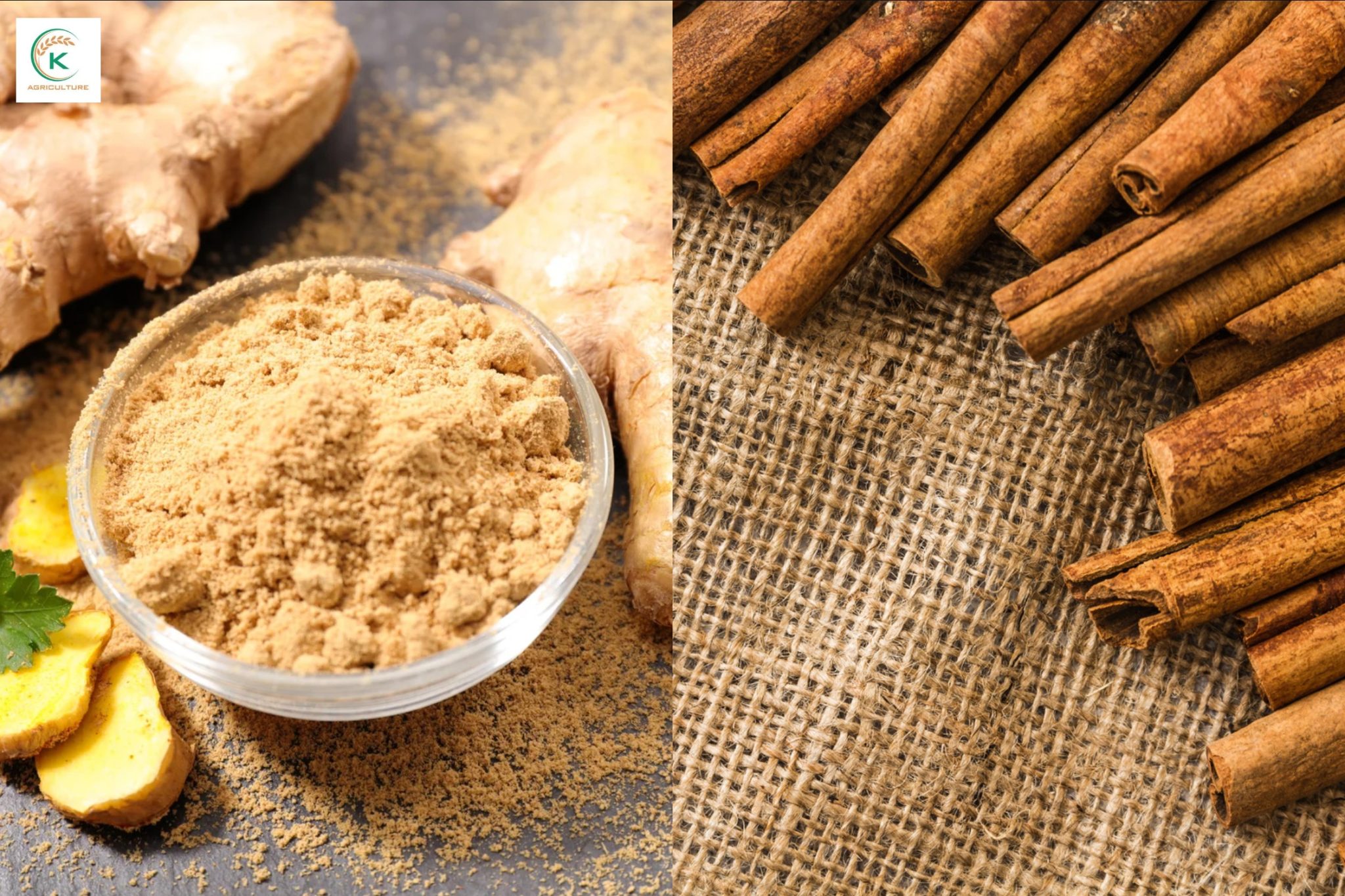
In addition, when you add cinnamon to your diet, it will significantly reduce bloating thanks to its digestive properties. Cinnamon’s antioxidants help soothe diarrhea, colic, and symptoms of fermentation such as bloating and gas. Therefore, cinnamon clearly improves the intestinal transit of food. To feel the cinnamon stick benefits, you should take cinnamon in the form of herbal tea. It is advisable that people with colds, chronic coughs, and sinusitis should eat a mixture of 1 teaspoon of honey mixed with 1/4 teaspoon of cinnamon for 3 consecutive days.
Cinnamon stick benefits are numerous, but you shouldn’t overdose!
Cassia cinnamon has a fairly high content of Coumarin, about 1%, while Ceylon cinnamon contains only 0.004% of coumarin content.
Cause Liver Damage
The Cassia cinnamon stick is a coumarin-rich food. The recommended daily limit of coumarin is approximately 0.1 mg/kg of total body weight, which means you cannot eat more than 1.5 teaspoons of cinnamon per day. Consuming too much coumarin will cause toxins to accumulate in the liver, thereby causing damage to this organ.
Increase the risk of Cancer
Eating too much coumarin in cinnamon may increase your risk of certain cancers. At the same time, coumarin also damages DNA over time, thereby increasing the risk of cancer.
Cause mouth sores
Some people have had mouth sores from eating too much cinnamon and products containing cinnamon flavorings. In reality, cinnamon contains cinnamaldehyde, a compound that causes allergic reactions when consumed in large amounts. A small amount of the spice doesn’t seem to cause this reaction because saliva prevents chemicals from staying in the mouth for too long, but large amounts can be harmful.

In addition to causing mouth sores, eating a lot of cinnamon also causes a burning sensation, itching in the mouth, swelling of the tongue or gums, and the appearance of white patches in the oral cavity. While these symptoms are usually not serious, they can still make you feel uncomfortable.
In conclusion, Cinnamon stick benefits are many, but you shouldn’t consume cinnamon in high doses!
5 Best Ways for the Use of Cinnamon Sticks at Home
There are many ways to take advantage of cinnamon stick benefits at home. Here we provide you with the 5 most popular and effective ways to use cinnamon sticks!
- In the Morning – Add a pinch of cinnamon powder/cinnamon stick to a cup of hot tea for a boost of energy to start the day. Or, add some to your coffee! The cinnamon stick has a natural light sweetness, so when added to drinks, it can reduce the amount of sugar in the cup of coffee. You will feel much more alert and refreshed.
- For coughs, colds, and flu – Add 1/2 teaspoon of cinnamon powder/1/2 stick of cinnamon in a cup of tea with lemon juice and honey.
- For digestive diseases – Add 1/2 teaspoon of cinnamon powder/1/2 stick of cinnamon in water, tea, or capsule form after a meal out where you’ve consumed foods that you normally wouldn’t eat.
- In the cold season: Cinnamon helps the body keep warm, increases lung capacity, and circulates the blood system. In the cold weather, a cup of cinnamon tea can help you warm up. Cinnamon can be mixed with ginger tea to increase the delicious taste.
- For fungus treatment and some skin disease prevention: Soak your feet in cinnamon water to increase blood circulation in the feet. It will help relax and refresh the spirit after a stressful working day. The way to do it is as follows, boil water and then add a dried cinnamon stick. Then, heat the fire until the cinnamon starts to come out. When the mixture is ready, you mix the above mixture with cold water to have a moderately warm temperature. Finally, soak your feet in warm cinnamon water for 10-15 minutes and relax your mind to get the best results!
See More Article: How to Use Cinnamon Sticks
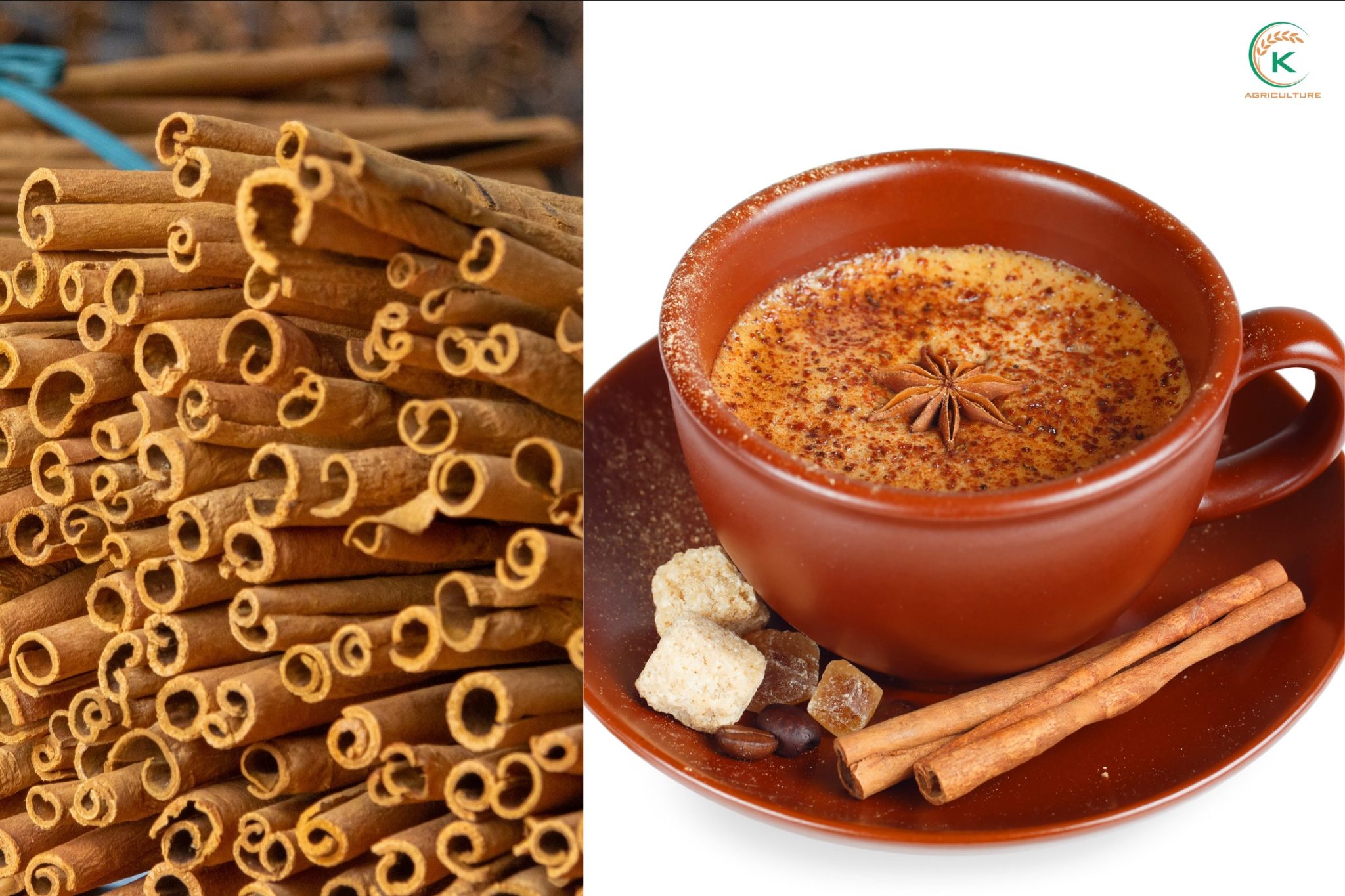
FAQs
How can cinnamon sticks help regulate blood sugar levels?
The answer is Yes. Compounds in cinnamon, particularly cinnamaldehyde, enhance insulin sensitivity and slow the breakdown of carbohydrates in the digestive tract, which can reduce post-meal blood sugar spikes.
What is the best way to prepare cinnamon sticks for consumption?
The most common method is to simmer one or two sticks in hot water for 10–15 minutes to make a fragrant cinnamon tea. The sticks can also be added whole to stews, rice, or mulled drinks and removed before serving.
Can cinnamon sticks aid digestion and reduce bloating?
Yes. Cinnamon’s warming compounds stimulate digestive enzymes, which can improve nutrient absorption and reduce gas and bloating. Drinking cinnamon-infused water after meals may enhance digestion
Do cinnamon sticks have antimicrobial and antifungal properties?
Cinnamon oil and extracts from the sticks contain cinnamaldehyde, which has been shown to inhibit the growth of bacteria and fungi such as Candida albicans, making it a natural preservative and oral health aid.
What is the function of cinnamon stick in boosting cognitive function?
Aroma and compounds in cinnamon have been associated with enhanced memory, attention, and processing speed. Drinking cinnamon tea or inhaling its scent may provide mild cognitive benefits.
Are there any side effects or precautions when using cinnamon sticks?
Cinnamon is generally safe in culinary amounts. However, excessive intake—especially of cassia cinnamon—can lead to liver irritation due to coumarin content. Pregnant women and individuals on blood-thinning medications should consult their healthcare provider.
How should cinnamon sticks be stored to retain their potency?
Store cinnamon sticks in an airtight container in a cool, dark place away from moisture. Properly stored sticks can retain flavor and benefits for up to two years.
K-Agriculture is a loyal vendor of thousands of B2B partners all over the world.
- Samples: Send via Express (DHL, VPS, FedEx,..)
- Order: By Air or By Sea based on INCOTERM 2010
- Website: kagriculture.crackoffice.site/
- WhatsApp: +84855555837 (Ms. Kris)
- Email: info@k-agriculture.com
Or, leave a message to us by filling out the form below. Due to time zone differences, we can not respond to you immediately. But we will reply to you as soon as possible within 1 day. Thanks for contacting us!
